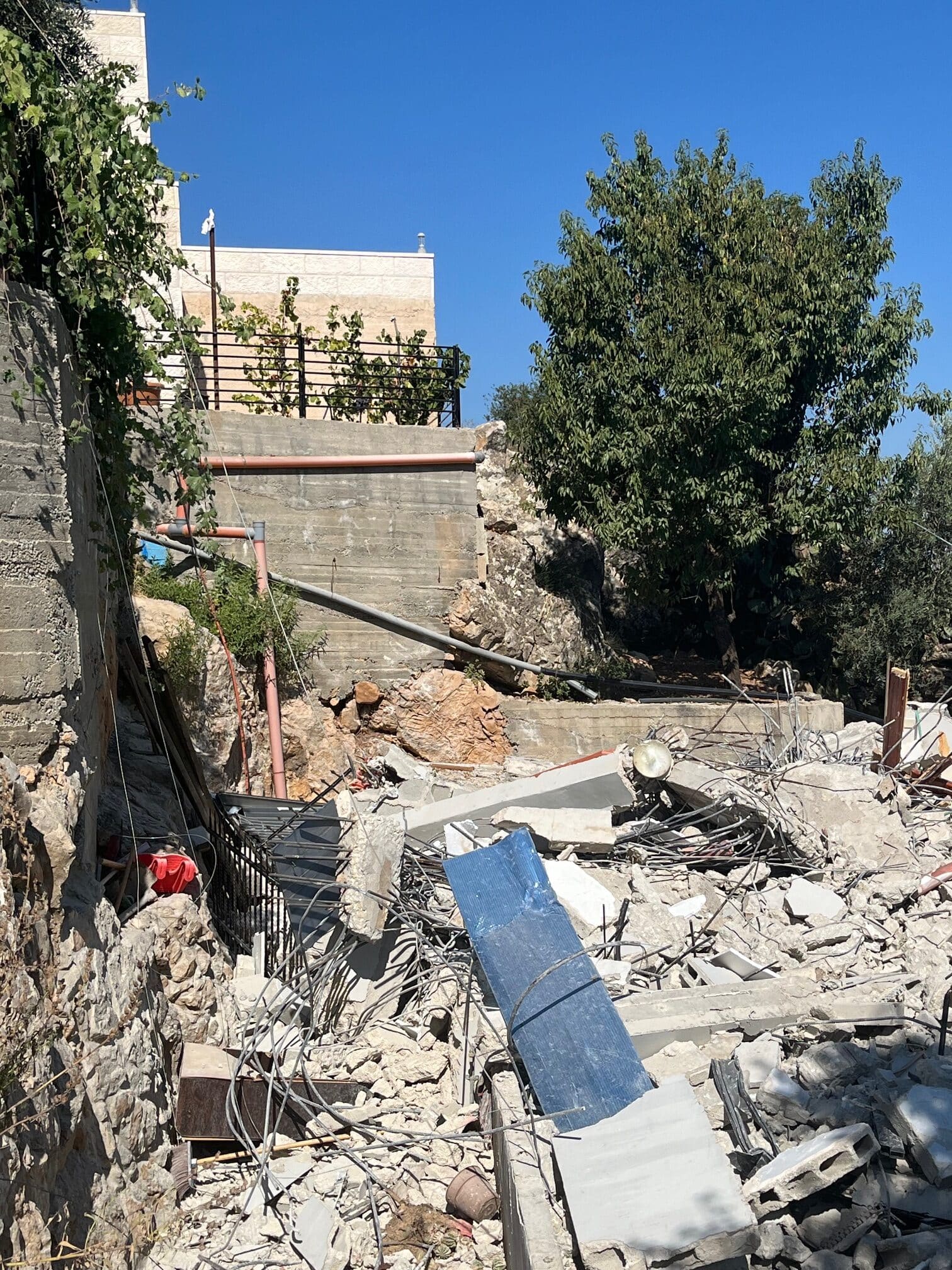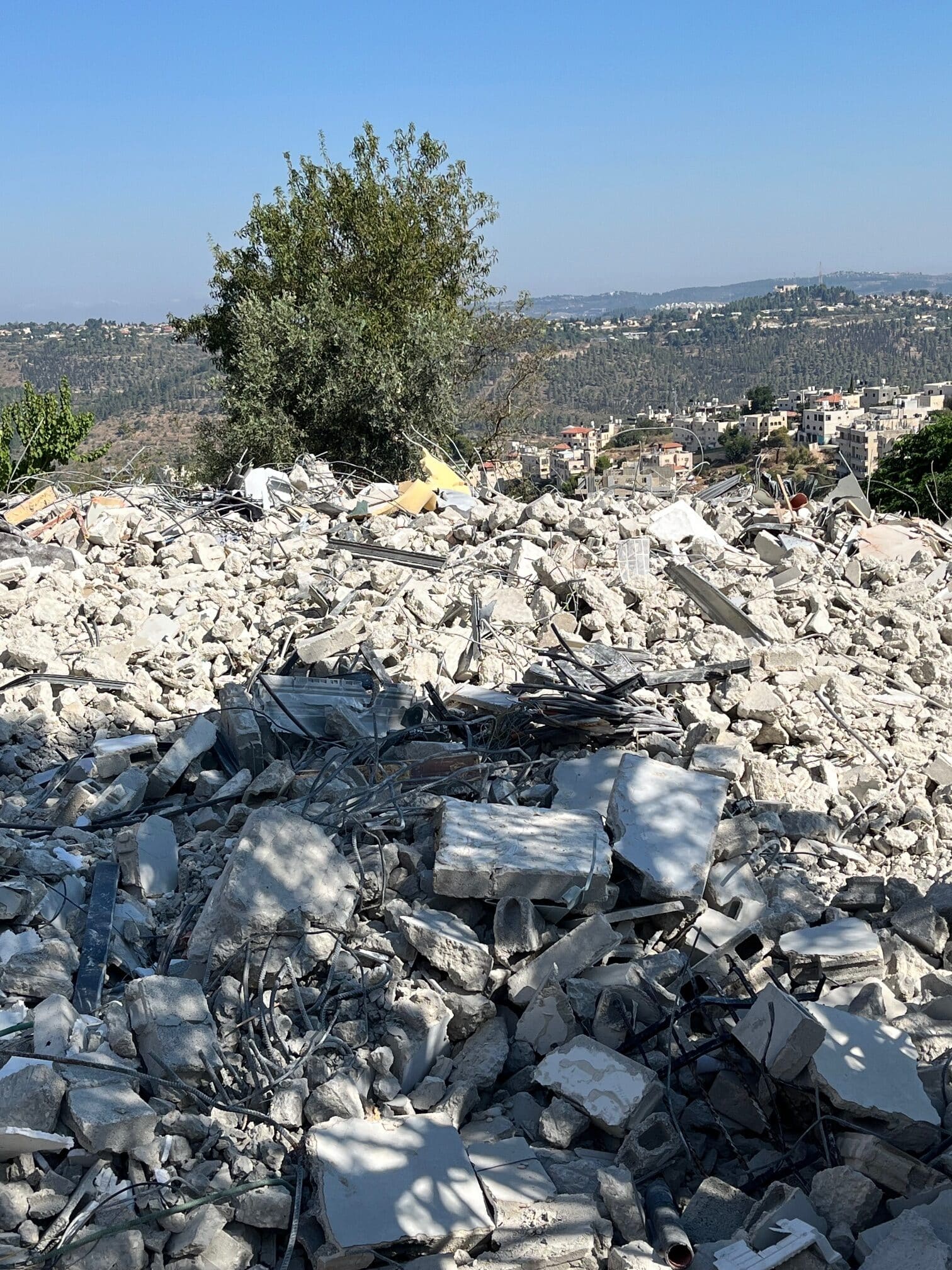‘Al-Walaja is a picturesque rural ancient village located on the high mountain ridge east of Bethlehem and southwest of Jerusalem. Until 1948, it was one of the largest agricultural villages in Palestine.’
On a Monday morning in late July, Mahmoud and Mustafa left their home in the Palestinian village of Al-Walaja and headed to work. They were called back when four jeeps, 15 soldiers, a minivan, and two bulldozers arrived to demolish their homes. The demolition was halted when a lawyer arrived, apparently with plans from 2019 indicating the buildings should be safe from demolition. There was a pause of about 40-minutes, but the demolition resumed once more, and we stood in witness as everything was destroyed, including the well and the trees in front of the house. Mahmoud and Mustafa’s mother and small children watched the scene from the balcony next door.
We returned to speak with the brothers the following day. There had been no prior warning, and they had left for work as usual. When the soldiers arrived, they raced back but were prohibited from entering the building and had to watch from afar. They could not remove their personal belongings, including papers, laptops, or jewelry. Mahmoud and Mustafa lived with their wives and six children in properties adjacent to their father. The homes were built about 12 years ago to provide for the growing families. Following the demolition, everyone had spent the night next door in their parent’s house, with the two men sleeping on the balcony. They told us;
‘Last night, the children were always scared and looking for soldiers. Some of the kids sat around for three hours looking at the rubble and crying.’
The people of Al Walaja have been suffering confiscations of their land since the the Arab-Israeli war of 1948, where 70% of the village was lost to Israel. Following 1967, when Israel militarily occupied the West Bank and further expanded its boundaries, Al-Walaja was effectively cut in half, and most of its remaining agricultural land became inaccessible to Palestinians. Its fragmentation continued with the building of the Separation Barrier in 2003; a tall concrete wall now surrounds the village on three sides. Israeli human rights organisation, B’Tselem describe the impact on the local life and landscape;
‘The Separation Barrier, which in that area mostly takes the form of a nine-meter-tall concrete wall… has cut [Palestinians] off from farmland where they grew olive and almond trees…. The barrier has also obliterated shepherding in the village, as it has greatly reduced available pastureland and cut off access to freshwater springs.’
Whilst Palestinian land is confiscated, and homes demolished, Israeli settlements continue to expand. The Israeli settlements of Gilo and Har Gilo were built on land confiscated from Al Walaja in 1970 and 1971, respectively.

Mahmoud and Mustafa’s home following the demolition
In November 2022, the Israeli Higher Planning Council discussed objections to the Har Gilo West plan for 560 housing units. This is described by the Israeli authorities as an expansion of the existing Har Gilo settlement; it would, in fact, constitute an entirely new settlement located southwest of Al-Walaja. Later in the month, plans were approved to expand the existing Al-Walaja bypass road for the purpose of promoting and validating the Har Gilo West settlement plan.
‘The construction of a new neighborhood will block and suffocate the village completely. Currently, the village is surrounded by the separation barrier in three directions, and the building of the new neighborhood will block the village in the fourth direction.’

Mahmoud and Mustafa’s home following the demolition
‘Without any possibility of receiving a permit and building legally, the needs of a growing population leave Palestinians no choice but to develop their communities and build homes without permits. This, in turn, forces them to live under the constant threat of seeing their homes and businesses demolished.’
According to the UN, at the time of writing, there have been 1,253 Palestinian structures demolished in the West Bank so far this year, the highest in more than a decade. When we met with the village council chair in the summer, he talked about the increase in demolitions in the village over the last couple of years. In 2022 and 2023, there were five demolitions each year; by July 31st, 2024, there had been 19. He ponders;
‘People ask me what’s going to happen next. What am I supposed to say to them?’
Since the war in Gaza began on 7 October, the demolition of Palestinian homes in the West Bank has accelerated. According the Israeli human rights organisation, Peace Now, this has been accompanied by an ‘unprecedented advancement’ of Israeli settlement plans.
The International Court of Justice ruled in 2024 that the Israeli occupation of Palestine is illegal. This historic ruling outlaws Israel’s 56-year-long military rule over millions of Palestinians, including its the demolition of Palestinian homes and the building of settlements. Join us in calling on elected representatives and faith leaders to support the findings of the court and to ensure accountability and justice for Mahmoud and Mustafa, and the tens of thousands of other Palestinians displaced from their homes:
Take action!
-
Sign and share our urgent action on the ICJ’s Palestine ruling! In the UK? Sign here. In Ireland? Sign here.
-
Part of a church or faith community? Join the campaign to ensure they are not investing funds in companies that profit from the illegal occupation.
-
Visit our action page to keep up to date with our other campaigns, subscribe for updates and follow us on social media.
What does international law say?

